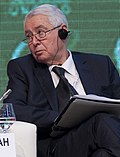| President of Council of the Nation | |
|---|---|
| رئيس مجلس الأمة | |
 | |
since 9 April 2019 | |
| Council of the Nation | |
| Style | Mister President of the Council |
| Formation | 5 January 1998 |
| First holder | Bachir Boumaza |
| Website | majliselouma.dz |
The president of the Council of the Nation of Algeria is the presiding officer of that body. From the creation of the Council of the Nation on 5 January 1998, it is the upper house of the Parliament of Algeria.


